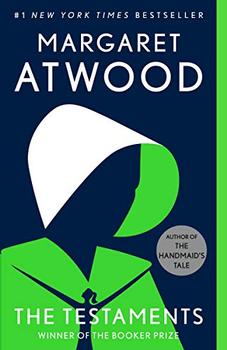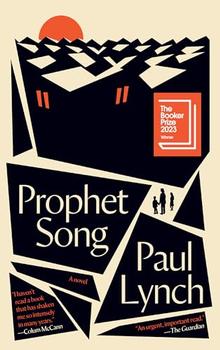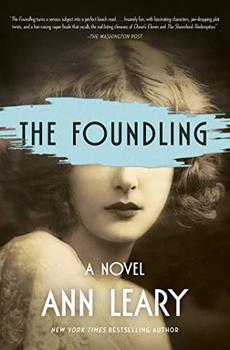Summary | Excerpt | Reading Guide | Reviews | Beyond the book | Read-Alikes | Genres & Themes | Author Bio

Critics' Opinion:
Readers' Opinion:
First Published:
Sep 2019, 432 pages
Paperback:
Sep 2020, 448 pages
 Book Reviewed by:
Book Reviewed by:
Kim Kovacs
Buy This Book
The Handmaid's Tale is narrated by Offred (known by no other name throughout the book, although the popular Hulu series gives her the moniker "June") and ends with the heroine getting into a black van, fate unknown. Although many readers had hoped for a continuation of this compelling woman's story, in The Testaments the author (probably wisely) chooses to continue Gilead's story 15 years after the events in the earlier book, employing three different female narrators. Two of these are teenagers, one raised within the male-dominated Gilead to be an obedient Wife, the other raised in Toronto, Canada, learning to hate the system created by her neighbors to the south. The third woman will be familiar to Atwood's readers and fans of the TV series: the formidable Aunt Lydia, who runs the Red Center, where she indoctrinates young women into becoming submissive Handmaids, enslaved fertile women who are to be impregnated by high-ranking Commanders whose Wives are infertile. It's this third voice that fills in the gaps in Atwood's earlier work, exploring how an intelligent, educated woman could be coerced into supporting a repressive regime.
Atwood brilliantly captures the two teenagers' voices, describing with complete authenticity that age when people often feel like they know everything but at the same time are vulnerable and insecure. The highlight, though is her portrayal of Aunt Lydia – older, wiser, more manipulative, and able to control her higher-ups and influence her place within the system. Although responsible for enforcing the policies penned by the powers-that-be, she doesn't embrace them. She has, however, learned how to survive within the toxic political regime, avoiding the purges that periodically thin the ranks of her male cohorts. She thrives on information and knows how to use it to better her position. I found her to be one of Atwood's most complex and compelling creations to-date.
The Testaments is without a doubt a five-star book; it's well-written, it's entertaining, and it moves extremely well. It's inevitable, though, that it will be compared to The Handmaid's Tale, and frankly it falls short of the bar. Atwood's earlier work is a more challenging book to read; it was frightening when it first came out, and in rereading it some 30-plus years later, it seems eerily prescient, far too accurate, and way too possible. It has depth, and I believe it ranks right up there with classic dystopian novels such as George Orwell's 1984. The Testaments may prove prophetic as well, but right now it feels too juvenile, too directed at a younger audience, and too positive and hopeful at the end.
For those curious, Atwood did work with the producers of the award-winning TV series, which moves well beyond events in The Handmaid's Tale, to make sure her current book dovetailed with where they were headed with their scripts (for example, they weren't allowed to kill off Aunt Lydia, since she's the star of the current novel). I can't help but feel this influenced Atwood's ultimate product, resulting in a book that feels somewhat predictable and, ultimately, less impactful; novels with a happy ending are entertaining and popular, but seldom are they the ones that provoke societal awareness and change.
Atwood, the author of over 40 books in various genres, is a master of the speculative fiction format (defined as a future that could happen with our existing technology, in contrast to science fiction, which relies on technology that hasn't been invented yet, such as speed-of-light space travel). The Testaments will surely please readers who appreciate this genre, particularly those who enjoy female-empowering stories such as The Hunger Games or Divergent. It's entertaining, and while not up to the standard of her earlier novel, still very much worth a read.
![]() This review was originally published in The BookBrowse Review in October 2019, and has been updated for the
September 2020 edition.
Click here to go to this issue.
This review was originally published in The BookBrowse Review in October 2019, and has been updated for the
September 2020 edition.
Click here to go to this issue.

If you liked The Testaments, try these:

by Paul Lynch
Published 2024
Exhilarating, terrifying and surprisingly intimate, Prophet Song offers a shocking vision of a country at war and a deeply human portrait of a mother's fight to hold her family together.

by Ann Leary
Published 2023
From the New York Times bestselling author of The Good House, the story of two friends, raised in the same orphanage, whose loyalty is put to the ultimate test when they meet years later at a controversial institution - one as an employee; the other, an inmate.





The House on Biscayne Bay
by Chanel Cleeton
As death stalks a gothic mansion in Miami, the lives of two women intertwine as the past and present collide.

The Flower Sisters
by Michelle Collins Anderson
From the new Fannie Flagg of the Ozarks, a richly-woven story of family, forgiveness, and reinvention.

The Funeral Cryer by Wenyan Lu
Debut novelist Wenyan Lu brings us this witty yet profound story about one woman's midlife reawakening in contemporary rural China.
Your guide toexceptional books
BookBrowse seeks out and recommends the best in contemporary fiction and nonfiction—books that not only engage and entertain but also deepen our understanding of ourselves and the world around us.